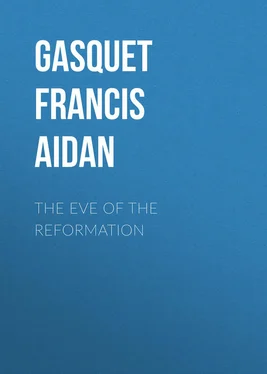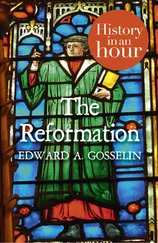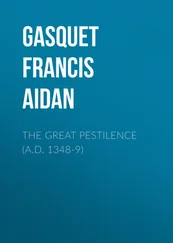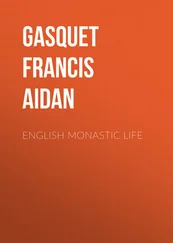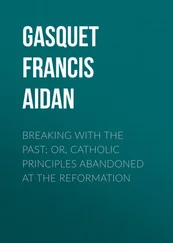Francis Gasquet - The Eve of the Reformation
Здесь есть возможность читать онлайн «Francis Gasquet - The Eve of the Reformation» — ознакомительный отрывок электронной книги совершенно бесплатно, а после прочтения отрывка купить полную версию. В некоторых случаях можно слушать аудио, скачать через торрент в формате fb2 и присутствует краткое содержание. Жанр: foreign_antique, foreign_prose, на английском языке. Описание произведения, (предисловие) а так же отзывы посетителей доступны на портале библиотеки ЛибКат.
- Название:The Eve of the Reformation
- Автор:
- Жанр:
- Год:неизвестен
- ISBN:нет данных
- Рейтинг книги:3 / 5. Голосов: 1
-
Избранное:Добавить в избранное
- Отзывы:
-
Ваша оценка:
- 60
- 1
- 2
- 3
- 4
- 5
The Eve of the Reformation: краткое содержание, описание и аннотация
Предлагаем к чтению аннотацию, описание, краткое содержание или предисловие (зависит от того, что написал сам автор книги «The Eve of the Reformation»). Если вы не нашли необходимую информацию о книге — напишите в комментариях, мы постараемся отыскать её.
The Eve of the Reformation — читать онлайн ознакомительный отрывок
Ниже представлен текст книги, разбитый по страницам. Система сохранения места последней прочитанной страницы, позволяет с удобством читать онлайн бесплатно книгу «The Eve of the Reformation», без необходимости каждый раз заново искать на чём Вы остановились. Поставьте закладку, и сможете в любой момент перейти на страницу, на которой закончили чтение.
Интервал:
Закладка:
If the same test be applied to the religious Orders, it will be found that they likewise equally profited by the new spirit. During the period from 1449 to 1459 the Benedictine Order had a yearly average of 4 graduates at Oxford, the other religious bodies taken together having 5. In the second period of 1506-1539 the Benedictine graduates number 200, and (allowing for gaps in the register) the Order had thus a yearly average of 6.75, the average of the other Orders during the same period being 5.2. If, moreover, the number of the religious who took degrees be compared with that of the secular students, it will be found that the former seem to have more than held their own. During the time from 1449 to 1459 the members of the regular Orders were to the rest in the proportion of 1 to 9.5. In the period of the thirty years immediately preceding the general dissolution it was as 1 to 9. Interest in learning, too, was apparently kept up among the religious Orders to the last. Even with their cloisters falling on all sides round about them, in the last hour of their corporate existence, that is in the year 1538-39, some 14 Benedictines took their degrees at Oxford.
In regard to Cambridge, a few notes taken from the interesting preface to a recent “History of Gonville and Caius College” will suffice to show that the monks did not neglect the advantages offered to them in the sister university. 59 59 J. Venn, Gonville and Caius College (1349-1897), Vol. I.
Gonville Hall, as the college was then called, was by the statutes of Bishop Bateman closely connected with the Benedictine Cathedral Priory of Norwich. Between 1500 and 1523 the early bursars’ accounts give a list of “pensioners,” and these “largely consisted of monks sent hither from their respective monasteries for the purpose of study.” These “pensioners paid for their rooms and their commons, and shared their meals with the fellows. All the greater monasteries in East Anglia, such as the Benedictine Priory at Norwich, the magnificent foundation of Bury, and (as a large landowner in Norfolk) the Cluniac House at Lewes, seem generally to have had several of their younger members in training at our college. To these must be added the Augustinian Priory of Westacre, which was mainly frequented (as Dr. Jessopp tells us) by the sons of the Norfolk gentry.” 60 60 Ibid., p. xvi.
The Visitations of the Norwich Diocese (1492-1532), edited by Dr. Jessopp for the Camden Society, contain many references to the monastic students at the university. In one house, for example, in 1520, the numbers are short, because “there were three in the university.” In another case, when a religious house was too poor to provide the necessary money to support a student during his college career, it was found by friends of the monastery, until a few years later, when, on the funds improving, the house was able to meet the expenses. This same house, the Priory of Butley, “had a special arrangement with the authorities of Gonville Hall for the reservation of a suitable room for their young monks.” One object of sending members of a monastery to undergo the training of a university course “was to qualify for teaching the novices at their own house”; for after they have graduated and returned to their monastery, we not infrequently find them described as “ idoneus preceptor pro confratribus ”; “ idoneus pro noviciis et junioribus ,” &c. Moreover, the possession of a degree on the part of a religious, as an examination of the lists will show, often in after life meant some position of trust or high office in the monastery of the graduate.
Nor was the training then received any light matter of form; it meant long years of study, and the possession of a degree was, too, a public testimony to a certain proficiency in the science of teaching. Thus, for example, George Mace, a canon of Westacre, who became a pensioner at Gonville Hall in 1508, studied arts for five years and canon law for four years at the university, and continued the latter study for eight years in his monastery. 61 61 Ibid., p. 18.
William Hadley, a religious of the same house, had spent eleven years in the study of arts and theology; 62 62 Ibid., p. 23.
and Richard Brygott, who took his B.D. in 1520, and who subsequently became Prior of Westacre, had studied two years and a half in his monastery, two years in Paris, and seven in Cambridge. 63 63 Ibid., p. 21.
“With the Reformation, of course, all this came to an end,” writes Mr. Venn, and we can well understand that this sudden stoppage of what, in the aggregate, was a considerable source of supply to the university, was seriously felt. On the old system, as we have seen, the promising students were selected by their monasteries, and supported in college at the expense of the house. As the author of the interesting account of Durham Priory says: “If the master did see that any of them (the novices) were apt to learning, and did apply his book and had a pregnant wit withal, then the master did let the prior have intelligence. Then, straightway after he was sent to Oxford to school, and there did learn to study divinity.” 64 64 Ibid., p. xviii.
Moreover, it should be remembered that it was by means of the assistance received from the monastic and conventual houses that a very large number of students were enabled to receive their education at the universities at all. The episcopal registers testify to this useful function of the old religious corporations. The serious diminution in the number of candidates for ordination, and the no less lamentable depletion of the national universities, consequent upon the dissolution of these bodies, attest what had previously been done by them for the education of the pastoral clergy. This may be admitted without any implied approval of the monastic system as it existed. The fact will be patent to all who will examine into the available evidence; and the serious diminution in the number of clergy must be taken as part of the price paid by the nation for securing the triumph of the Reformation principles. The state of Oxford during, say, the reign of Edward VI., is attested by the degree lists. In the year 1547 and in the year 1550 no student at all graduated, and the historian of the university has described the lamentable state to which the schools were reduced. If additional testimony be needed, it may be found in a sermon of Roger Edgworth, preached in Queen Mary’s reign. Speaking of works of piety and pity, much needed in those days, the speaker advocates charity to the poor students at the two national universities. “Very pity,” he says, “moves me to exhort you to mercy and pity on the poor students in the universities of Oxford and Cambridge. They were never so few in number, and yet those that are left are ready to run abroad into the world and give up their study for very need. Iniquity is so abundant that charity is all cold. A man would have pity did he but hear the lamentable complaints that I heard lately when amongst them. Would to God I were able to relieve them. This much I am sure of: in my opinion you cannot bestow your charity better.” He then goes on to instance his own case as an example of what used to be done in Catholic times to help the student in his education. “My parents sent me to school in my youth, and my good lord William Smith, sometime Bishop of Lincoln, (was) my bringer up and ‘exhibitour,’ first at Banbury in the Grammar School with Master John Stanbridge, and then at Oxford till I was a Master of Arts and able to help myself.”
He pleads earnestly that some of his hearers may be inspired to help the students in the distress to which they are now reduced, and so help to restore learning to the position from which it had fallen in late years. 65 65 Sermons (1557), f. 54.
Интервал:
Закладка:
Похожие книги на «The Eve of the Reformation»
Представляем Вашему вниманию похожие книги на «The Eve of the Reformation» списком для выбора. Мы отобрали схожую по названию и смыслу литературу в надежде предоставить читателям больше вариантов отыскать новые, интересные, ещё непрочитанные произведения.
Обсуждение, отзывы о книге «The Eve of the Reformation» и просто собственные мнения читателей. Оставьте ваши комментарии, напишите, что Вы думаете о произведении, его смысле или главных героях. Укажите что конкретно понравилось, а что нет, и почему Вы так считаете.
